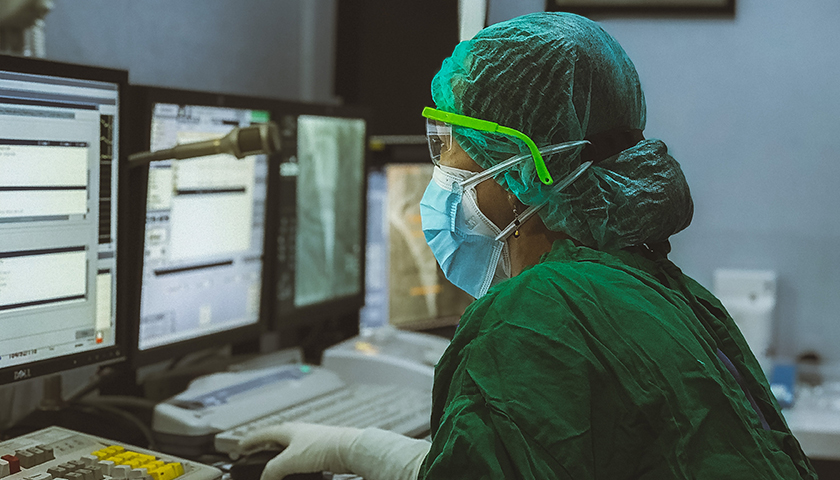by Debra Heine
Infectious disease expert Dr. Anthony Fauci argued in 2012 that the benefits of gain-of-function research were worth the risk of causing a pandemic through a lab accident.
In a paper for the American Society for Microbiology, unearthed by the Australian, Fauci wrote, “the benefits of such experiments and the resulting knowledge outweigh the risks.” He also wrote, “it is more likely that a pandemic would occur in nature.”
Gain-of-function research involves “juicing up” viruses to make them more infectious and deadly in humans.
Experts early on raised the possibility that the COVID-19 pandemic originated from a lab leak at the Wuhan Institute of Virology in Wuhan, China, where U.S.-funded gain-of-function experiments on bat coronaviruses were being conducted. Fauci, however, repeatedly shot down any suggestion that the coronavirus may have stemmed from the Wuhan lab, arguing instead that it “occurred in nature.”
In 2012, Fauci, the longtime director of U.S. National Institute of Allergy and Infectious Diseases (NIAID, wrote that gain-of-function experiments were “important work,” well worth the risks.
In an unlikely but conceivable turn of events, what if that scientist becomes infected with the virus, which leads to an outbreak and ultimately triggers a pandemic? Many ask reasonable questions: given the possibility of such a scenario – however remote – should the initial experiments have been performed and/or published in the first place, and what were the processes involved in this decision?
Scientists working in this field might say – as indeed I have said – that the benefits of such experiments and the resulting knowledge outweigh the risks. It is more likely that a pandemic would occur in nature, and the need to stay ahead of such a threat is a primary reason for performing an experiment that might appear to be risky.
Within the research community, many have expressed concern that important research progress could come to a halt just because of the fear that someone, somewhere, might attempt to replicate these experiments sloppily. This is a valid concern.
BOMBSHELL! Dr Fauci in 2012 wrote that “gain of function” research to juice up bat viruses was worth risking a pandemic: “the benefits of such experiments and the resulting knowledge outweigh the risks. It is more likely that a pandemic would occur in nature” @SharriMarkson scoop https://t.co/S7ILuzgnNw pic.twitter.com/iwyPCPctId
— Miranda Devine (@mirandadevine) May 28, 2021
The Weekend Australian report noted that Fauci did not alert senior White House officials before lifting the ban on gain-of-function research in 2017.
In 2014, the Obama administration paused funding for gain-of-function experiments in 22 fields, including those involving SARS, influenza and MERS because of the increased risk such experimentation carries of causing a pandemic. In 2012, when Fauci authored the paper supporting gain-of-function research, there was a voluntary ban on such experiments related to highly infectious influenza viruses.
Yet the EcoHealth Alliance diverted $600,000 in grants from the NIH to the WIV in the form of sub-grants from 2014 through 2019, for the purpose of studying bat coronaviruses.
When Senator Rand Paul (R-Ky.) pressed Fauci about this during a Senate hearing earlier this month, he denied that the NIH had any part in funding the gain-of-function research at the Wuhan lab.
“That categorically was not done,” Fauci insisted.
Paul has since accused Fauci of committing perjury in front of congress.
“He lied to the American people,” Paul told host David Brody on Real America’s Voice earlier this week.
The Kentucky Senator explained that “there was gain of function research going on” at the Wuhan Institute with Dr. Shi Zhengli.
In her paper, she actually thanked Dr. Fauci and National Institute of Allergy and Infectious Diseases (NIAID), which is a part of National Institutes of Health (NIH) that Dr. Fauci runs.
It’s listed at the end of the paper. This paper was fined by NIAID research, and it lists a ten-digit number that identifies the research money she got from the United States. Was it gain of function?
Well, it took a SARS virus, which is a coronavirus, that’s 15 times more deadly than COVID, and it added to it S protein, which is something in the surface of it, to make it more easily infectious to epithelial cells for the respiratory tract. That, to me, is gain of function.
Paul pointed out that two scientists, one from Rutgers University and another from Massachusetts Institute of Technology, have confirmed the research described in the paper was “gain of function.”
– – –
Debra Heine reports for American Greatness.








